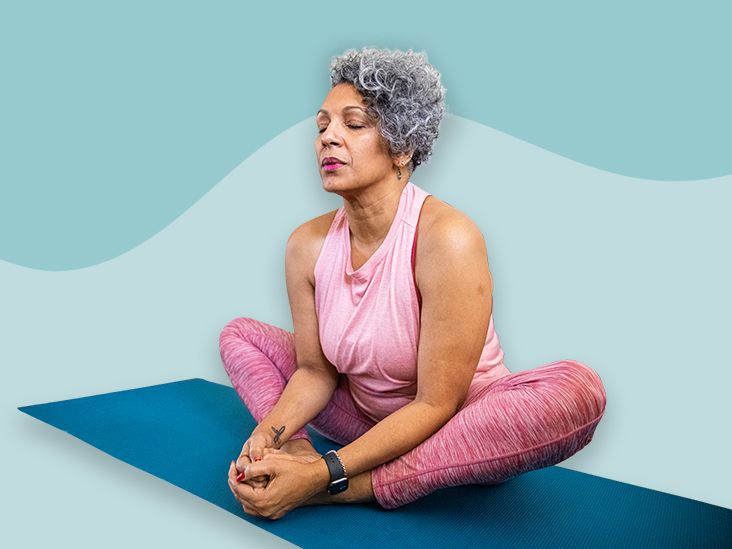Mental health includes your psychological and social well-being. It also encompasses your emotional health, which refers to your ability to name, address, and regulate your emotions.

You might notice discussions about mental health online, in conversation with family or friends, on your favorite show, or in any number of other places.
But what exactly is mental health?
“Mental health is about the functionality of your brain and all that impacts it,” said Oludara Adeeyo, a psychiatric social worker and author of “Self-Care for Black Women.”
Many factors play a part in mental health, some of which you can’t control, such as genetics, life experiences, and family history.
But you do have influence over other important aspects of your mental health, noted KC Davis, a licensed professional counselor and author of “How To Keep House While Drowning.”
Your ability to influence your mental health is key because the state of your mental health matters.
Mental health helps determine how you handle stress, relate to others, and make choices, explained Alison Seponara, a licensed professional counselor and author of the book “The Anxiety Healer’s Guide.”
Seponara goes on to say that caring for your mental health can lead to:
- improved mood
- reduced anxiety
- clearer thinking
- deeper relationships
- improved self-esteem, self-worth, and confidence
Nurturing your mental health can also help you manage health conditions that are worsened by stress, like heart disease, said Seponara.
Your mental health can impact everything about your life, Adeeyo said, including the ways you view and move through the world and your ability to handle the things life throws at you.
That’s why building habits for better mental health can make a big difference in your day-to-day life.
Pro tipAs you explore new behaviors and begin incorporating them into your routine, aim to frame these changes as self-kindness, not self-punishment. Maintaining a gentle, kind attitude toward yourself can do a lot more to improve your mental health and overall outlook than criticism and negative self-talk.
“Work on your mental health from a place of care,” Davis recommended.
Not sure where to start? You’ll find 8 strategies to promote improved mental health below, along with some guidance on seeking professional support.
Sleep isn’t just a nonnegotiable for physical health. It also plays an essential role in mental health.
The American Psychological Association reported in 2023 that sleep deprivation makes people less happy and more anxious.
The quality of your sleep matters, too. Disrupted sleep can contribute to mental health symptoms.
To get enough high quality sleep, try starting with these habits:
- Avoid caffeine after 3 p.m.
- Try to wake up and go to sleep at the same time every day.
- Make your bedroom into a quiet, relaxing, clutter-free space.
- Aim to keep the temperature in your bedroom somewhere between 60°F and 65°F (16°C to 18°C).
Healthy sleep habits can be harder to build on your own if you have a sleep disorder.
If you think your sleeping issues may relate to a sleep condition, a sleep specialist can offer more information about helpful evidence-based treatments, like cognitive behavioral therapy for insomnia.
Mental health concerns can also lead to poor sleep, which means changes to your sleep environment and nighttime routine might not make a lasting difference. If you don’t notice much improvement after trying these strategies, connecting with a therapist may be a helpful next step.
“Constantly consuming information about other people’s lives may cause someone to compare themselves and promote feelings of low self-worth, which increases feelings of anxiety and depression,” said Adeeyo.
To spend less time on social media, try to:
- keep your phone in a drawer or outside your bedroom while you’re in bed
- make a list of other, more meaningful activities to replace your usual scrolling sessions
- turn off notifications or delete social apps from your phone
Humans are social creatures, and strong relationships can have a positive influence on your mental health in various ways.
Friendships, for example, can:
- ease feelings of loneliness
- make it easier to get emotional support
- add meaning to your life
You have plenty of options for cultivating positive connections and nurturing your friendships:
- Keep in touch by checking in regularly, even with just a quick text or funny meme.
- Meet up for a morning walk or breakfast.
- Call for a short chat during your lunch break.
- Schedule biweekly or monthly dinner dates.
Exercise offers a range of mental health benefits, including:
- relieving stress
- lifting mood
- helping you fall asleep faster and sleep longer
- helping you manage symptoms of depression and anxiety conditions
Movement can involve something different for every person, and it doesn’t have to mean going to the gym if that’s not your thing. Instead, make movement enjoyable for you by opting for physical activities that work best for your body, health, and preferences.
To get started, experiment with a range of physical activities, and keep doing the ones that resonate with you.
Enjoyable movement could include:
- joining a running or walking club
- taking a slower-paced restorative yoga class
- trying seated exercises
- throwing a dance party
- taking stretching breaks every hour
- gardening or doing other work in your backyard
- going on a weekend family hike or walk along the beach
In other words, you don’t have to do a vigorous workout to support mental wellness.
“Taking a few minutes to stretch can make a huge difference for your overall mental health. Stretching will help with blood flow and get more oxygen through your body, which can help you feel more relaxed and happy,” said Christopher S. Taylor, PhD, LPC-S, founder of Taylor Counseling Group, author of “My Digital Practice,” and host of the “For Self-Examination” podcast.
Certain foods can also affect your mental health. To support improved mental health, try expanding your current diet to include foods packed with mood-boosting nutrients like:
- berries
- bananas
- beans
- whole grains
- fatty fish, like salmon
It can also help to simply make sure you fuel your body every day — eating something is better than eating nothing.
Drinking plenty of water throughout the day is also beneficial.
“When you’re dehydrated, you’re denying your brain and body the nutrients needed to survive and operate at a more optimal level,” Adeeyo noted.
Certain foods, namely alcohol, caffeine, refined carbs, and added sugars, may worsen anxiety symptoms. Limiting these foods could help ease some of your symptoms.
On difficult days, you might find it tough to do any of the above, which might make you feel even worse.
At times like these, Davis encouraged turning to compassionate, more accessible strategies, like:
- giving yourself permission to stay in and rest
- engaging in breath work even if it’s just for a few minutes
- taking a bath or a long, hot shower
- buying a nutritious prepackaged meal when cooking anything feels close to impossible
A similar approach you can try? Commit to taking one small step every day.
“Whether it’s making your bed, drinking one glass of water in the morning, or writing in a journal, making this daily promise to yourself will help to eventually become a habit, and you will begin to feel empowered,” Seponara explained.
While what constitutes “rest” may vary from person to person, it generally means giving your mind and body the opportunity to unwind and restore.
Rosie Acosta, meditation and yoga teacher and author of the book “You Are Radically Loved,” suggested trying yoga Nidra, a sleep-based meditation.
She recommended the following steps:
- Lie on your back with your hands by your sides. Spread your feet apart — the distance of your hips, or a bit wider.
- Think of being relaxed, yet present. You feel calm, but still aware.
- Bring your attention to your physical body and then to your breath.
- On an inhale, imagine a slow-moving wave entering from the soles of your feet and traveling to the crown of your head.
- On the exhale, visualize a slow-moving wave traveling from the crown of your head back down to the soles of your feet.
- Feel your body become heavy, and stay with this relaxed present awareness for 10 to 30 minutes.
If you only have a few minutes to relax, Acosta suggested these quick restorative practices:
- Put both hands over your heart, close your eyes, and take several deep breaths, feeling the warmth and comfort of your touch.
- Breathe in for 2 counts and breathe out for 4 counts for 12 cycles.
“The sun is a great source of vitamin D, and
Your outdoor time doesn’t have to be long, either. As Taylor noted, “Five minutes of blue skies can do your mind and your heart some real good.”
If you have several minutes, Taylor recommended:
- taking a quick walk
- sitting in your backyard, on your balcony, or at a local green space
- standing outside breathing in the fresh air
- opening a window near your desk, if possible
- taking a work meeting outside, if you can
- eating lunch at a nearby park
- exercising outdoors or engaging in another physical activity outside, like gardening or stretching
The strategies above can help improve mental well-being, but they can’t “cure” any mental health conditions.
To put it another way, making changes in your habits may not always relieve persistent mental distress. Working with a therapist, however, can be a particularly powerful way to improve mental health.
You can consider professional support at any time. You don’t need to have depression, anxiety, or any specific mental health symptoms to benefit from therapy.
That said, reaching out becomes particularly important if you:
- have experienced a stressful or traumatic event
- feel more upset, anxious, or sad than usual
- frequently feel agitated, irritable, or angry
- have had a decrease in motivation
- have noticed changes in your appetite and sleep patterns
- often find it difficult to get through the day
- feel stuck or overwhelmed
- rely on alcohol or other substances more than usual or turn to harmful coping behaviors
Your mental health plays a key role in your quality of life. Many of the factors that can affect mental health remain beyond your control, but adding beneficial habits to your days can promote greater wellness.
Just know that when it comes to adopting new habits, it’s generally more helpful to start with only one or two at a time, instead of a complete overhaul. Then, check in with yourself to take stock of how those changes helped.
Margarita Tartakovsky, MS, has been writing for Psych Central and other websites for more than a decade on a wide range of topics. She’s the author of the mental health journal “Vibe Check: Be Your Best You” (Sterling Teen). She’s especially passionate about helping readers feel less alone and overwhelmed and more empowered. You can connect with Margarita on LinkedIn, or check out her writing at her website.











